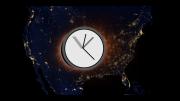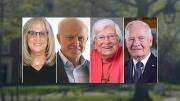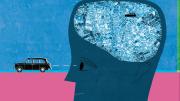Karin Johnson ’99 was paying close attention earlier this month when the U.S. Senate voted on the Sunshine Protection Act, which would make daylight saving time permanent starting next year. When senators approved the bill—to the cheers of many Americans who loathe the time change each fall and spring—Johnson, director of the Baystate Medical Center Regional Sleep Program, was alarmed. This was a worst-case scenario.
“We have three clocks,” she explains: “social time, sun time, and circadian time.” Social time is what we see on our clocks. Sun time refers to the level of daylight produced by the sun. And circadian time is our body’s time; it tells us when we want to go to sleep and when we want to wake. All three influence our sleep; circadian time and sun time both influence when we naturally want to sleep because sunlight leads our bodies to produce cortisol (the hormone which wakes us), a desire which is sometimes impeded by social time, which dictates our work schedules and other obligations.
Ideally, all three of these clocks should be in alignment, Johnson says. Having social time, sun time, and circadian time more or less align produces optimal conditions for sleep, since it makes it easier for us to rest when our body wants to. So, for example, the average adult in Boston might find it fairly easy to be at work at 9 a.m. (social time) in July, when the sun rises (sun time) around 5:30 a.m.—that early sunrise allows the body to produce enough cortisol to wake up naturally (circadian time) well before eating breakfast or beginning a commute. But that same adult might be less well-rested for a 9 a.m. start in December, when the sun rises at 7:15 a.m. With a shift to permanent daylight saving time, that sunrise would correspondingly shift to 8:15 a.m.
In order to pass the Sunshine Protection Act in the Senate, Florida Senator Marco Rubio, one of the bill’s sponsors, called a voice vote on the measure. Under that procedure, the Senate can pass legislation if senators in attendance approve unanimously. At the time of the vote on March 15, many weren’t present—a few, including some of the bill’s opponents, apparently weren’t even aware that it was under discussion. None of the senators in the chamber voiced any opposition, and so the Senate did the unexpected: it passed a bill.
Johnson wishes they hadn’t. While making daylight saving time permanent may seem benign, or even beneficial—it would eliminate a time change that polls show a majority of Americans find odious—sleep researchers like her generally say that it’s standard time, not daylight saving time, that should become permanent. And polls show that when given a choice, most Americans prefer standard time, too.
On average, standard time makes it more likely that social time, sun time, and circadian time will align. Experts argue that the status quo—a time change to daylight saving time during spring—results in poorer sleep through the duration of daylight saving time. The time change itself, they say, results in sleep deprivation that triggers more car accidents and more strokes around the time of the change. However, they like permanent daylight saving time even less than a time change, which they say could result in poorer sleep year-round, leading to a variety of health impacts including higher incidence of cancer and mental illness.
“The way we rank it is: permanent daylight savings time is the worst, status quo is the middle, and standard time is by far the best,” Johnson says.
Permanent daylight saving time moves social time to an hour earlier than standard time, and so sleep researchers argue that it results in the largest misalignment among the three clocks. Having the sun rise at what appears on the clock as a later time makes it more likely that people will have to rise before their bodies are ready. Take, for example, an 8:15 a.m. (daylight saving) sunrise in Boston, when sunlight-induced cortisol might not naturally wake someone until 8:30 a.m.: many adults whose workday begins at 9 a.m. might have to leave for their offices before their bodies naturally want to wake. Furthermore, because the sun sets later, the average person might go to sleep later (on social time) than she would if she had been on standard time.
This adult, sleep researchers argue, is ultimately more likely to be sleep-deprived than if she had been on standard time—essentially, her natural cycle of sleep is disrupted. Currently, for the duration of daylight saving time, the average adult loses 19 minutes of sleep a night, compared to the months when clocks are on standard time. This effect is worse for teenagers and shift workers who start early. Scientists fear that making daylight saving time permanent in the winter, when the sun already rises later, could cause people to lose even more sleep.
While one might intuit that people will simply adjust to a time change, studies show that this isn’t actually the case. Johnson notes that while daylight saving time moves social time an hour earlier, average cortisol levels during the duration of daylight saving time only peak two minutes earlier than they would have during standard time. Essentially, our bodies still want to wake up at the same sun time, regardless of social time.
To return to the Boston example, then, during the winter an adult might be groggier than he would be under standard time during his morning commute, when many drive their cars. Because the sun may not have risen yet, or may have just risen, this also means that the visibility for those drivers is lower.
That many people feel like they adjust to daylight saving time doesn’t mean they actually have, says Johnson. Research into people who were consistently sleep-deprived over a set period of time shows that while their measured performance on cognitive tasks decreased over that period of time, they tended not to consciously notice this decline. Thus, if people sleep less because of daylight saving time, they might not take much note of it.
“They're passing [the Sunshine Protection Act] on a slogan that it's going to add more daylight,” says Charles Czeisler, Baldino Jr. professor of sleep medicine at Harvard Medical School (HMS), who teaches a popular course for undergraduates called “Sleep” (which enrolled more than 800 students in the fall semester). “But of course, there isn’t any more sunshine. It’s a question of the hour at which sunshine falls. [The bill] would have been universally slammed if the slogan, instead of being ‘add more sunshine,’ had been ‘who wants to wake up an hour earlier?’”
Proponents of daylight saving time claim that it saves energy by decreasing the need for light usage at night, preventing traffic injuries and reducing crime. Advocates for permanent daylight saving add that it might combat rates of seasonal depression.
Sleep researchers say that there is little evidence to support these claims. Evidence shows that daylight saving time may actually increase energy usage, especially in the summer, when daylight hours are often accompanied by use of air conditioners. Meanwhile, sleep deprivation, which may result from daylight saving time, is associated with increased traffic injuries, more crime, and increased mental health problems.
Johnson highlights that while several countries have previously tried to make daylight saving time permanent—including the United States in 1974—all of them eventually reversed their decision. Data from Russia, which made daylight saving time permanent from 2011 to 2014, show the measure’s negative effects. “It ended because there were more suicides,” says Johnson. “There were more heart attacks, there were more people feeling stressed and mood disorders.”
Research on time zones in the United States shows higher rates of several kinds of cancer for people living on the western edge of time zones, where social time and circadian time are more out of alignment for the average person. The Sunshine Protection Act would effectively make “everybody live on the extreme west,” says Czeisler. If each progressive move west is associated with a small increase in cancer risk, he says, permanent daylight savings would result in “taking all these numbers and multiplying them by three. That would be the increased cancer risk associated with doing this.”
Johnson notes that in the past, sleep research in favor of permanent standard time has been eclipsed by lobbying on behalf of the golf and oil industries, for whom permanent daylight saving time would be beneficial because it would lead to greater activity later in the day—more people driving, shopping, or at the golf course.
Though sleep researchers have typically stayed away from political advocacy, many have started to become more vocal. Johnson directs Save Standard Time, a nonprofit founded in 2021 to advocate for permanent standard time. The group regularly meets with members of Congress to present evidence for the argument against daylight saving time.
“We don’t want to sit here and write papers that people don’t read or don’t do anything about,” says Elizabeth Klerman, professor of neurology in HMS’s division of sleep medicine, who is also a member of Save Standard Time. Next year, she and Czeisler will conduct a seminar on standard time at the Radcliffe Institute. “Just think of gun violence prevention or drunk driving,” she adds. Public health experts learned how to become effective advocates for evidence-based policies “many, many years ago. Cigarette smoking, that was a combination of law, public advocacy, public support, all sorts of education campaigns. We haven’t done that before. And we are learning how to do that now.”









